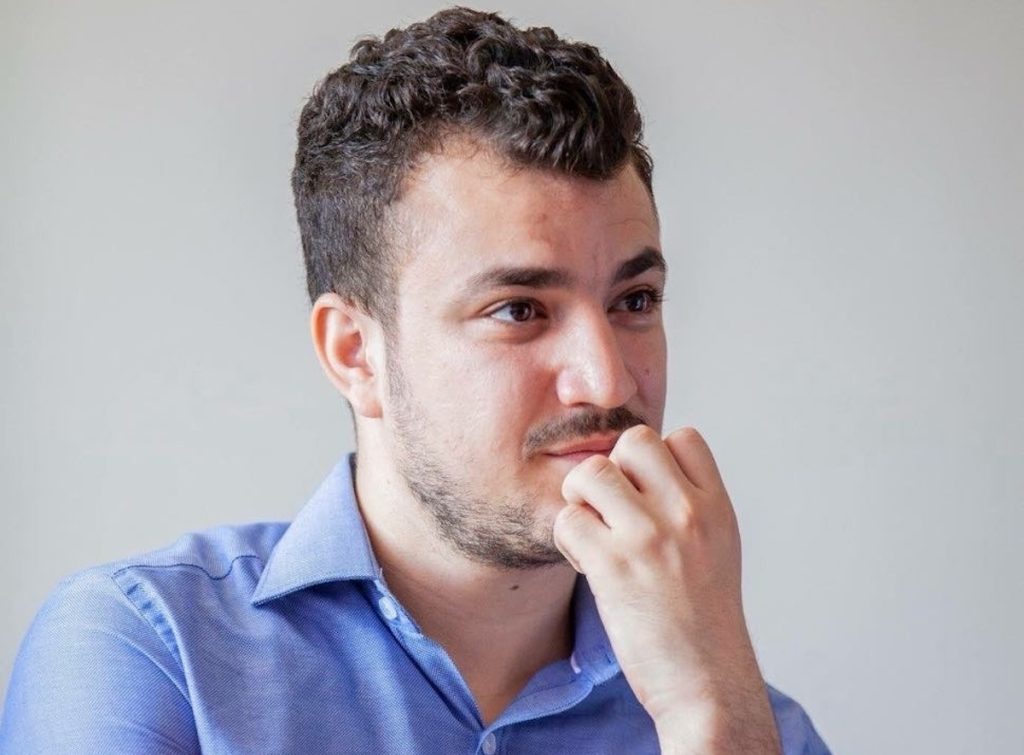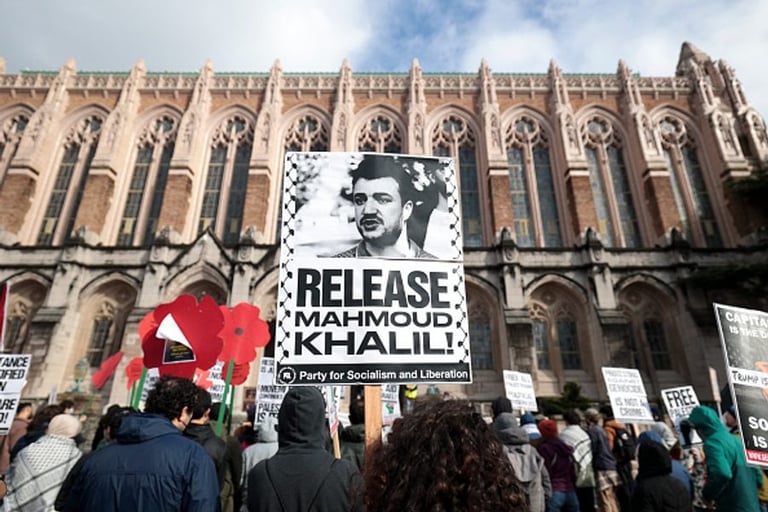Letter from Mahmoud Khalil, a Palestinian political prisoner in Louisiana
Mahmoud Khalil writes from an ICE detention facility: "The Trump administration is targeting me as part of a broader strategy to suppress dissent."
DailyBeastie.Com
3/20/20257 min read


The following letter was dictated by Mahmoud Khalil to his lawyers over the phone from an ICE detention center
My name is Mahmoud Khalil and I am a political prisoner.
I am writing to you from a detention facility in Louisiana where I wake to cold mornings and spend long days bearing witness to the quiet injustices underway against a great many people precluded from the protections of the law.
Who has the right to have rights?
It is certainly not the humans crowded into the cells here.
It isn’t the Senegalese man I met who has been deprived of his liberty for a year, his legal situation in limbo and his family an ocean away.
It isn’t the 21-year-old detainee I met, who stepped foot in this country at age nine, only to be deported without so much as a hearing.
Justice escapes the contours of this nation’s immigration facilities.
On March 8, I was taken by DHS agents who refused to provide a warrant, and accosted my wife and me as we returned from dinner.
By now, the footage of that night has been made public.
Before I knew what was happening, agents handcuffed and forced me into an unmarked car.
At that moment, my only concern was for Noor’s safety.
I had no idea if she would be taken too, since the agents had threatened to arrest her for not leaving my side.
DHS would not tell me anything for hours — I did not know the cause of my arrest or if I was facing immediate deportation.
At 26 Federal Plaza, I slept on the cold floor.
In the early morning hours, agents transported me to another facility in Elizabeth, New Jersey.
There, I slept on the ground and was refused a blanket despite my request.
My arrest was a direct consequence of exercising my right to free speech as I advocated for a free Palestine and an end to the genocide in Gaza, which resumed in full force Monday night.
My arrest was a direct consequence of exercising my right to free speech as I advocated for a free Palestine and an end to the genocide in Gaza, which resumed in full force Monday night.
With January’s ceasefire now broken, parents in Gaza are once again cradling too-small shrouds, and families are forced to weigh starvation and displacement against bombs.
It is our moral imperative to persist in the struggle for their complete freedom.
I was born in a Palestinian refugee camp in Syria to a family which has been displaced from their land since the 1948 Nakba.
I spent my youth in proximity to yet distant from my homeland. But being Palestinian is an experience that transcends borders.
I see in my circumstances similarities to Israel’s use of administrative detention — imprisonment without trial or charge — to strip Palestinians of their rights.
I think of our friend Omar Khatib, who was incarcerated without charge or trial by Israel as he returned home from travel.
I think of Gaza hospital director and pediatrician Dr. Hussam Abu Safiya, who was taken captive by the Israeli military on December 27 and remains in an Israeli torture camp today.
For Palestinians, imprisonment without due process is commonplace.
My unjust detention is indicative of the anti-Palestinian racism that both the Biden and Trump administrations have demonstrated over the past 16 months as the U.S. has continued to supply Israel with weapons to kill Palestinians and prevented international intervention.
I have always believed that my duty is not only to liberate myself from the oppressor, but also to liberate my oppressors from their hatred and fear.
My unjust detention is indicative of the anti-Palestinian racism that both the Biden and Trump administrations have demonstrated over the past 16 months as the U.S. has continued to supply Israel with weapons to kill Palestinians and prevented international intervention.
For decades, anti-Palestinian racism has driven efforts to expand U.S. laws and practices that are used to violently repress Palestinians, Arab Americans, and other communities.
That is precisely why I am being targeted.
While I await legal decisions that hold the futures of my wife and child in the balance, those who enabled my targeting remain comfortably at Columbia University.
Presidents Shafik, Armstrong, and Dean Yarhi-Milo laid the groundwork for the U.S. government to target me by arbitrarily disciplining pro-Palestinian students and allowing viral doxing campaigns — based on racism and disinformation — to go unchecked.
Columbia targeted me for my activism, creating a new authoritarian disciplinary office to bypass due process and silence students criticizing Israel.
Columbia surrendered to federal pressure by disclosing student records to Congress and yielding to the Trump administration’s latest threats.
My arrest, the expulsion or suspension of at least 22 Columbia students — some stripped of their B.A. degrees just weeks before graduation — and the expulsion of SWC President Grant Miner on the eve of contract negotiations, are clear examples.
If anything, my detention is a testament to the strength of the student movement in shifting public opinion toward Palestinian liberation.
If anything, my detention is a testament to the strength of the student movement in shifting public opinion toward Palestinian liberation.
Students have long been at the forefront of change — leading the charge against the Vietnam War, standing on the frontlines of the civil rights movement, and driving the struggle against apartheid in South Africa.
Today, too, even if the public has yet to fully grasp it, it is students who steer us toward truth and justice.
The Trump administration is targeting me as part of a broader strategy to suppress dissent.
Visa-holders, green-card carriers, and citizens alike will all be targeted for their political beliefs.
In the weeks ahead, students, advocates, and elected officials must unite to defend the right to protest for Palestine.
At stake are not just our voices, but the fundamental civil liberties of all.
Knowing fully that this moment transcends my individual circumstances, I hope nonetheless to be free to witness the birth of my first-born child.

Fareed Zacharia: The Trump administration said it was cancelling $400 million in grants and contracts for Columbia University accusing the Ivy League school of condoning anti-Semitism on campus.
The administration says dozens of other schools are also under investigation for failing to stop anti-semitism and last week authorities arrested Mahmoud Khalil who helped lead student protests at Colombia over Israel's war in Gaza while he was a graduate student. He holds a green card and now faces possible deportation.
Khalil supporters say all he has done is espouse pro-Palestinian views that are not anti-semitic.
To explain the legal dimensions of the administration's actions I am joined by Noah Feldman, professor of constitutional law at Harvard.
Noah, welcome. This gets to the sort of central question that in some ways was part of that hearing with the university presidents right which is, does a university have the right to combat anti-Semitism or are those views protected by the First Amendment?
PROF. NOAH FELDMAN: If you explain your views in the classroom or in a conversation, you are protected under the First Amendment and you're allowed to say them and that means the government can't punish you, and if you're at a private university - most private universities have rules of academic freedom that also protect your expression of your view; however, according to university rules and according to federal law as it's been interpreted by various relevant actors, if you discriminate or harass or bully somebody as part of an act of discrimination, then you can be punished for expressing anti-semitic or racist views as part of that harassment.
Fareed Zacharia: So you you define it very well and then we get to this, the hard test here which is, suppose you're not in the classroom, it's not a private conversation - you are publicly espousing anti-semitic or racist views. There are other people around there.
Does that count as free speech or does that count as intimidation and harassment?
PROF. NOAH FELDMAN: When you are standing, let's say in a protest, you should in principle both under the university's rules and under the First Amendment be allowed to say what you believe - no matter how repugnant it might be.
When you're targeting what you're saying at particular people and you're, let's say in their face in such a way that it could be described as bullying or harassment, then you've crossed the line and both the law and university regulations prohibit you from doing so.
Fareed Zacharia: And when you take a look at what the administration is doing in trying to deport Khalil and things like that now you know that it's a different situation where you have every right to revoke a green card or VISA, but do you worry about the fact that this could be interpreted as an attack on the First Amendment?
PROF. NOAH FELDMAN: It is an attack on the First Amendment. It's not close to an attack, because the US Supreme Court has held all the way back to World War II so for 80 plus years that if you are a non-citizen who's present here lawfully and you're living in the United States - as Khalil was on a green card - you have full First Amendment rights.
So for the administration to deport him, if it's the case, that they're doing so solely because of his expression of views that are protected by the First Amendment, then that is an attack on his First Amendment rights and so by extension it's an attack on everybody's First Amendment rights, because there's no difference constitutionally between a citizen and a non-citizen with respect to free speech.
Fareed Zacharia: What they say is the administration says is this is not free speech, this is, he supports a terrorist organization. Is that a you know legitimate distinction or is you know is one allowed to espouse support for a political organization?
PROF. NOAH FELDMAN: When the US Supreme Court has addressed this issue in the past, what they have said in a famous opinion by the current Chief Justice John Roberts, is that if you are materially supporting a terrorist organization - that is you're working alongside them, then that could be prohibited by law; but if you're engaged in what is called uncoordinated advocacy - that is you're just expressing your view that you think terrorism is great and you support terrorist organizations - that is fully protected by the First Amendment.
And so unless Khalil were to be shown to have materially supported terror, which is a crime, his speech is protected by the First Amendment.
Fareed Zacharia: Noah Feldman this was incredibly clarifying. Thank you.
PROF. NOAH FELDMAN: Thank you.


Political news, commentary for the enraged reader
contact@dailybeastie.com
© 2025 DailyBeastie.Com - All rights reserved.

